James Patterson MasterClass review synopsis
What you’ll learn: Learn the secrets of writing a novel from famed author James Patterson.
How long does the James Patterson MasterClass take?: The James Patterson MasterClass takes 3 hours and 31 minutes to complete.
Similar courses: Neil Gaiman, Dan Brown, R.L. Stine, Judy Blume, Shonda Rhimes, N. K. Jemisin
Do I recommend James Patterson’s MasterClass?: I definitely recommend this MasterClass to all aspiring novelists — Patterson’s no-nonsense style will push you to finish your novel.
Learn how to write your novel with the James Patterson MasterClass
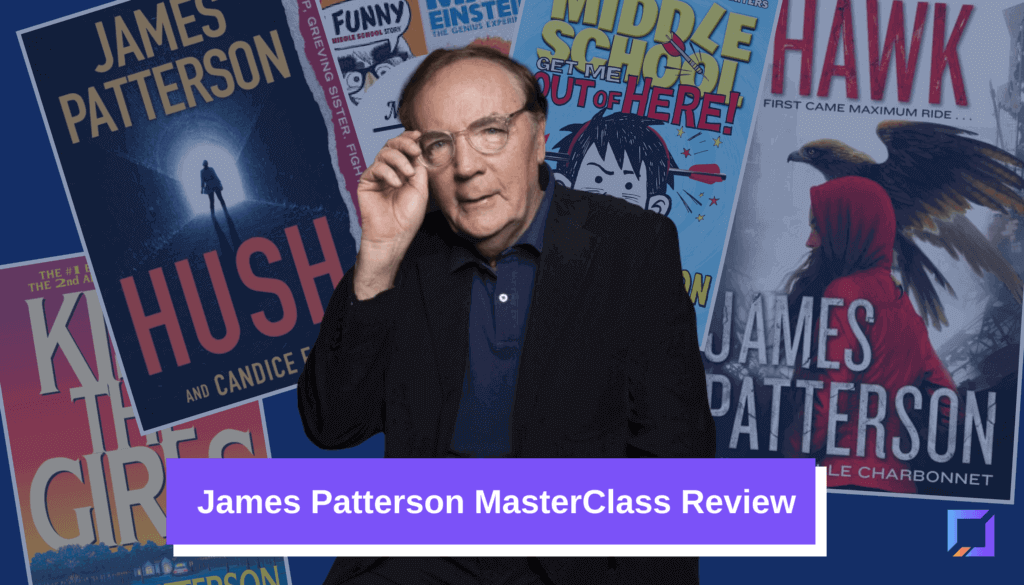
“I’m actually writing a book.”
I can’t tell you how many people I’ve heard say these words to me. It’s incredibly common to hear this when you tell someone you’re a writer and have books on the market.
Everyone has a story inside their head, but not everyone will actually take the time to write it out. Chances are, 99% of those people who say they’re going to write a book will never actually do it.
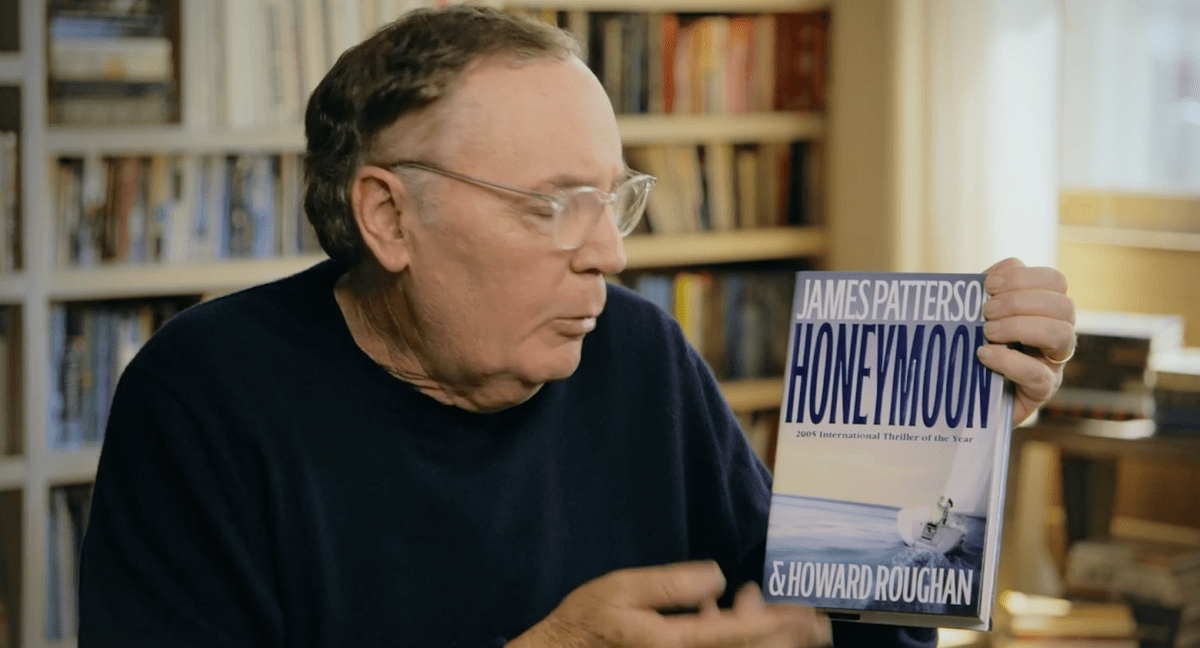
The polar opposite of this phenomenon is James Patterson, famed author of more than 200 novels. It seems like every time you turn around, there’s a new James Patterson book hitting shelves (or Kindles, it’s 2021).
So, reason dictates that James Patterson knows how to write a book. He knows how to get it started, how to get it done, and how to successfully get that book into the hands of the masses.
That makes him the perfect teacher for young aspiring authors in theory. And you’re in luck because James Patterson has a writing MasterClass. But can James Patterson actually teach you how to write a novel?
That’s what we’re going to look into in this James Patterson MasterClass review. I’m going to break down Patterson’s MasterClass, giving you an idea of what you can expect from the curriculum laid out by one of the world’s most famous authors.
Disclosure: In the interest of full transparency, Codeless uses affiliate links in our MasterClass reviews to cover our site’s costs.
Our Verdict
Patterson’s MasterClass is an energetic look at an exciting career from a fascinating individual. It will not only arm you with the tools that you need to finally write that novel you’ve been working on for years, but it will also make you excited to do it.
James Patterson MasterClass Write the book of your dreams today.
PROS
- He’s funny
- Gives examples from authors he admires
- Passionate but casual — feels like a conversation
- Takes you beyond writing into editing, marketing, covers, titles, and more
- Section on writing for Hollywood
- Includes a real Patterson outline
CONS
- Little concrete advice about breaking through writer’s block
- Not a lot of variety in the visuals
- Only a few breakdowns from his own books
In this MasterClass review, you’ll learn:
A few frequently-asked questions…
Do I need a subscription to access this course?
Yes, James Patterson’s MasterClass is a part of all MasterClass subscription levels. There is no way to take the course without a membership.
How long is the MasterClass?
Patterson’s writing MasterClass takes 3 hours and 31 minutes to complete. It’s broken down into 22 separate video lessons.
Does MasterClass have a cancellation policy?
All MasterClasses come with a handy 30-day money-back guarantee.
Is the James Patterson MasterClass worth it?
James Patterson makes novel writing feel worthwhile and fun. His passion bleeds through in every lesson, and he’s fun to listen to. I definitely feel that this MasterClass is worth the price of a membership.
Refine your writing with the James Patterson MasterClass
About James Patterson
James Patterson is the famed author of more than 200 novels since his debut in 1976. He is known for works such as Alex Cross, Women’s Murder Club, Along Came a Spider, Witch and Wizards, Daniel X, and many more.
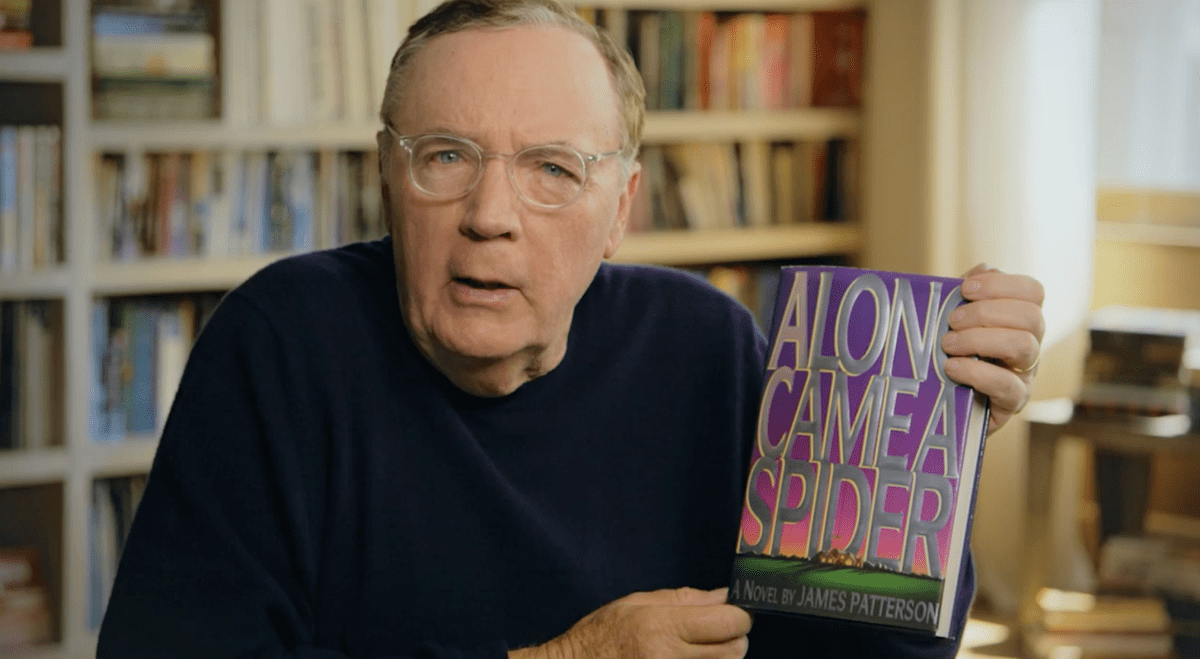
Patterson has sold more than 300 million copies of his books and was the first author to sell 1 million ebooks. He topped the Forbes list of highest-paid authors in 2016 with an estimated annual income of $95 million.
How much does James Patterson’s MasterClass cost?
Patterson’s MasterClass is included with any of the three basic MasterClass subscriptions. All of them are billed annually, and all come with a 30-day money-back guarantee.
Here’s how the MasterClass subscription prices break down:

Standard
Price: $15 per month billed annually
You have access to all MasterClass courses on one device at a time. Supported devices include a computer, TV, phone, or tablet. All classes come with a workbook and bonus content, including access to the MasterClass Hub, a members-only community forum.
Plus
Price: $20 per month billed annually
Includes everything offered on the Standard plan, along with accessing classes on two devices at the same time. Videos can be downloaded for offline viewing on an iOS device.
Premium
Price: $23 per month billed annually
Includes everything from the Plus Plan, with the option to watch classes on six devices at the same time.
Choose the MasterClass subscription level that suits your needs
What is included in the James Patterson MasterClass?
Runtime: 3 hours and 31 minutes
Course Value: 4.5/5
Lessons: 22
Supplementary materials: Class guide, outline sample, MasterClass Hub
Supplementary workbook
The James Patterson MasterClass workbook is fairly common among MasterClass supplementary workbooks.
It’s not called a workbook, however. They refer to it as a Class Guide, which I’ve seen in a few other MasterClasses do. Space is provided for note-taking throughout and there aren’t a lot of images. As a result, it can feel pretty monotonous and intimidating.
However, some sections are laid out differently in a more visually appealing way.
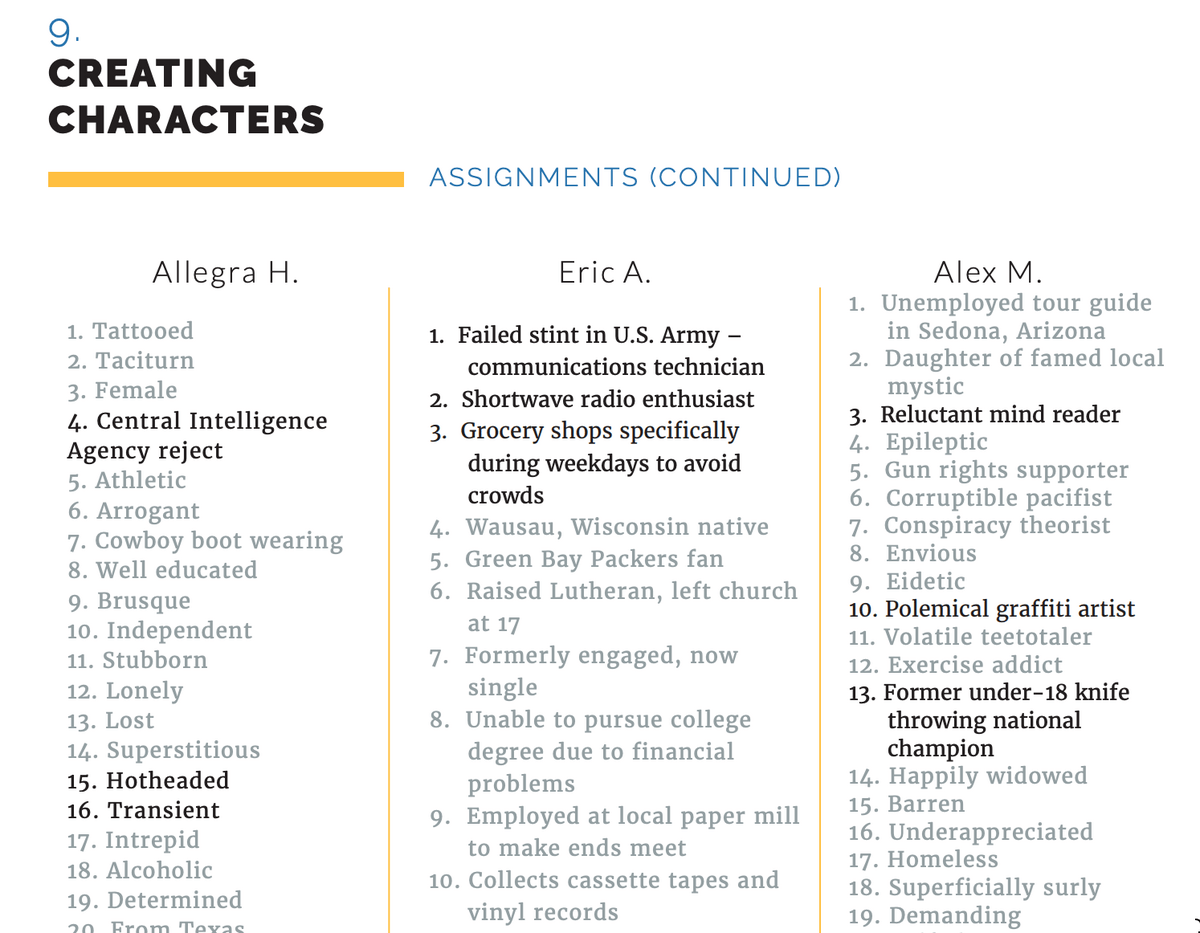
But what I really loved was an extra special bit that this class included. You actually get a sample outline from Patterson’s book, Honeymoon.
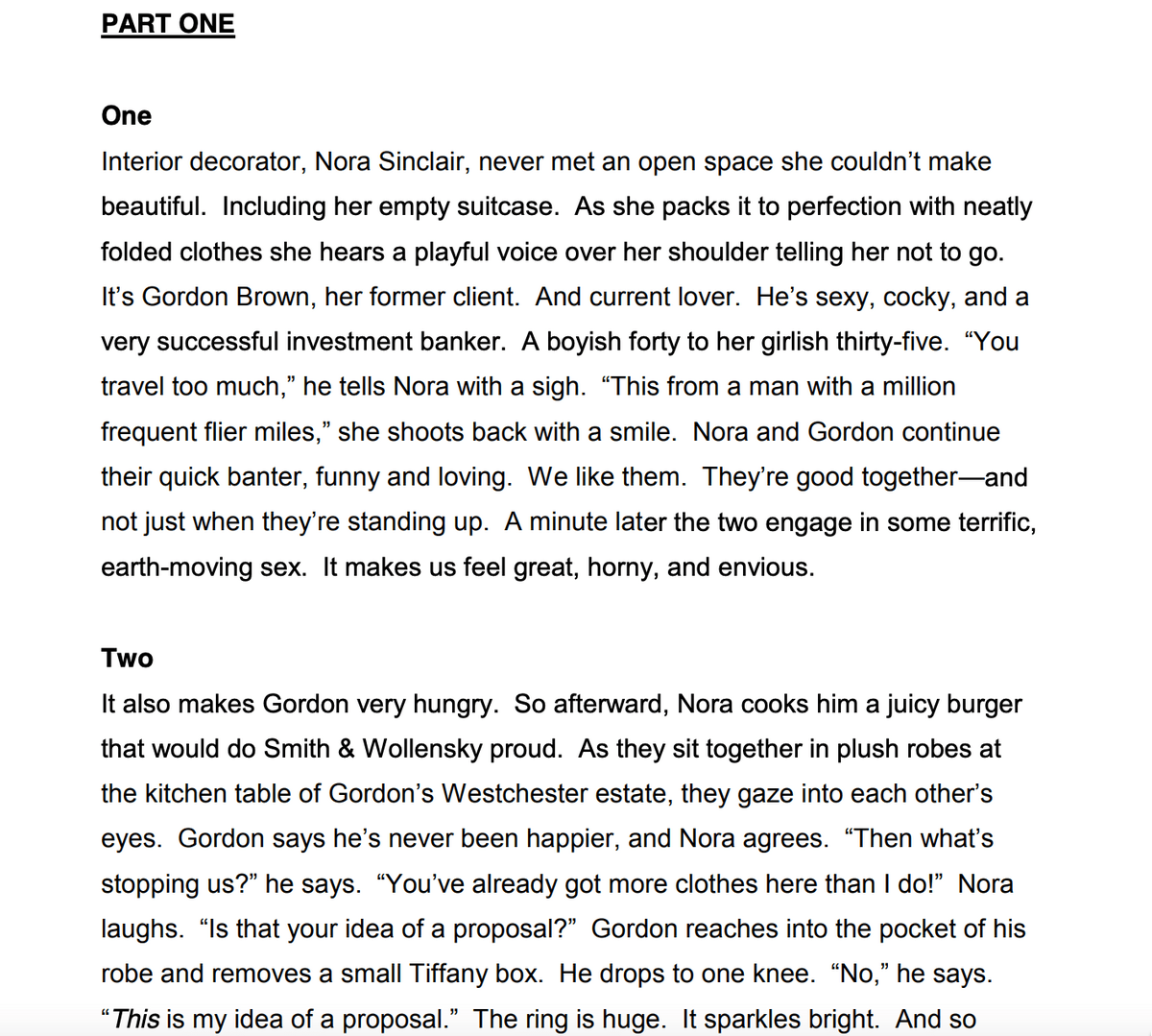
Patterson talks at length about outlines and their importance, so this feels like a worthy inclusion that I haven’t seen from other authors on this site.
The MasterClass Hub
Patterson’s MasterClass Hub is alive and well in a way that you don’t see from many MasterClasses.
He has a wealth of conversation topics, many of which have responses in the hundreds.
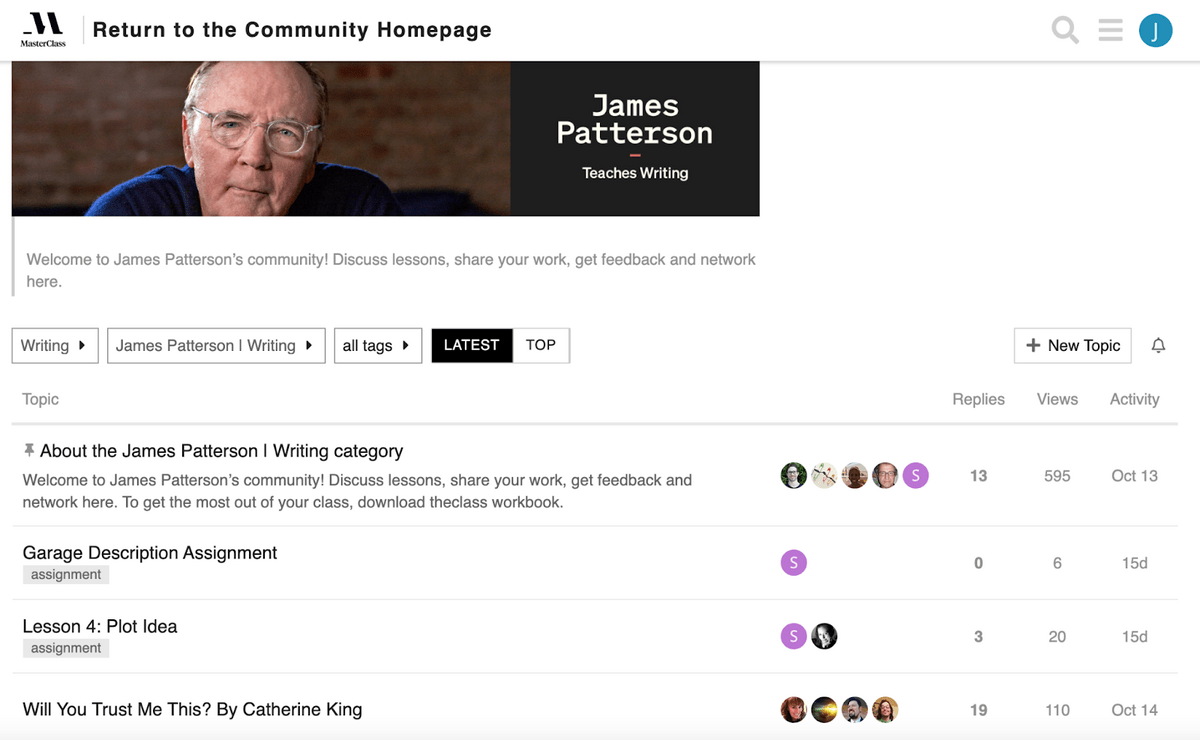
Compared to the MasterClass Hubs for Madhur Jaffrey or Bobbi Brown, this is Woodstock.
A complete breakdown of the James Patterson MasterClass curriculum
Patterson breaks his MasterClass curriculum down into 22 videos, which come out to just a bit more than three and a half hours.
Here’s how the classes are laid out.
Curriculum:
- Introduction
- Passion + Habit
- Raw Ideas
- Plot
- Research
- Outlines: Part 1
- Outlines: Part 2
- Writer’s Block
- Creating Characters
- First Lines
- Writing Dialogue
- Building A Chapter
- Writing Suspense
- Ending The Book
- Editing
- Working With a Co-Author
- Getting Published
- Book Titles And Covers
- Marketing The Patterson Way
- Hollywood
- Personal Story
- Closing
Course summary:
As an author, James Patterson is a huge source of inspiration to me.
To someone still in the lobby of the author hotel like me, James Patterson is a goliath of success, someone to be looked up to and praised for his monumental commitment to the writing industry.
So, I walked into this MasterClass really hoping that he was going to knock it out of the park.
I wasn’t disappointed.
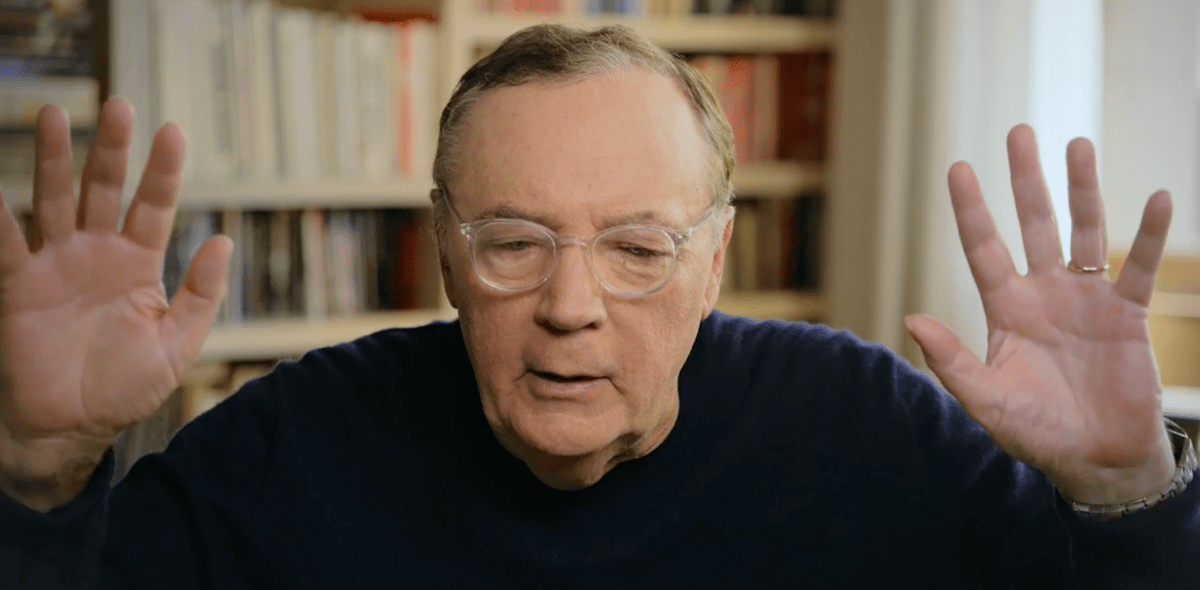
Patterson walks you through the writing process from the conception of an idea, through the actual writing of your story (outline, writing, editing), and beyond that into marketing, the publishing process, writing for Hollywood, covers, titles, and more.
There’s even a section on working with a co-author, which I found particularly fascinating.
And all the while, I was just taken with this very special human being. He explains his process to you, along with how he spends his days. He’s completely delighted with his life of writing, and after 200 novels clearly hasn’t lost the passion that drove him in the beginning.
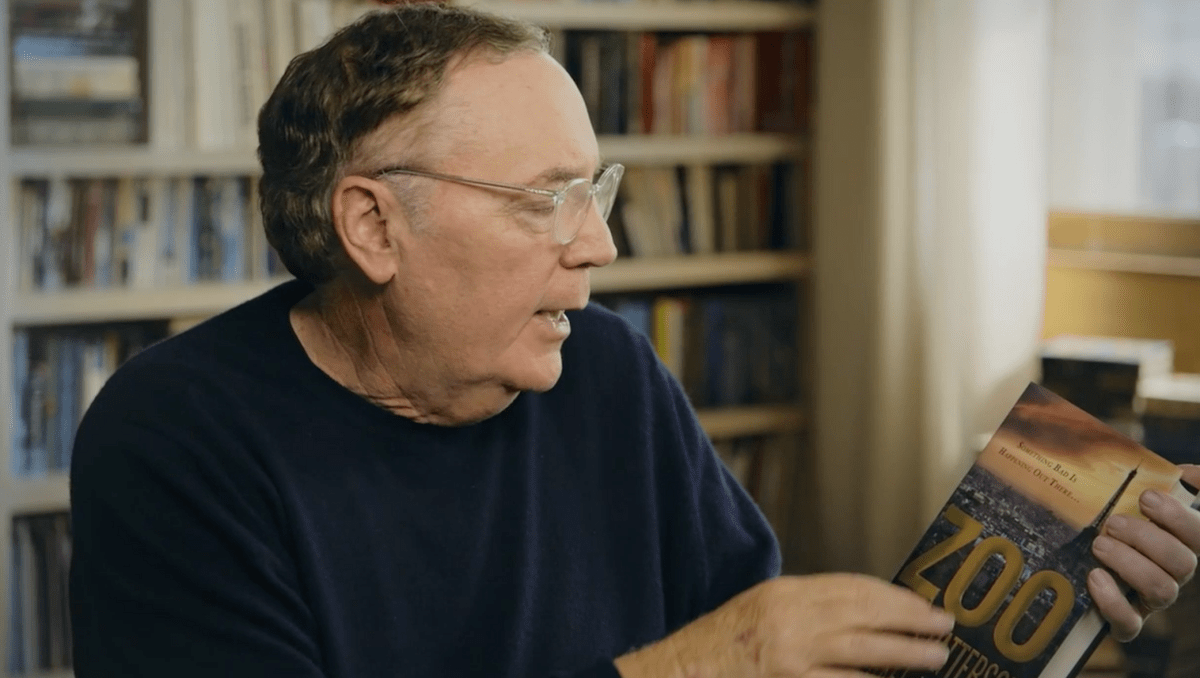
He’s also really funny. He makes some jokes that made me actually laugh out loud.
His first words in the class were, “I’m Stephen King. Actually, I’m not Stephen King,” and he spun that right away into discussing the importance of first lines in a book.
This was very different from my experience reviewing Neil Gaiman’s MasterClass because these are two very different writers with two very different approaches to the writing process. I think to be a fully realized and well-rounded novelist, you should take as many of these writing MasterClasses as possible.
I’d put Patterson’s at the top of that list.
What I learned
My dad and my grandfather absolutely love James Patterson. As a kid, I remember they would always run out to get the new James Patterson book.
And it seemed like there was a new one every single month!
Patterson is a writing machine. He churns out content like McDonald’s churns out burgers; only his books are actually good.
When I started writing my own books, I looked to James Patterson as a source of inspiration. He is the author’s dream and has been living that life for longer than I’ve been alive. And as a writer, I pulled a lot of information from this class that I’m eager to try as I start on my next novel this week.
For starters, I never outlined my work. I just let the story dictate where it went. But Patterson made a lot of good points about outlining, and now I’m going to give it a try and see how it fits my style.
So, I was super thrilled to kinda-sorta “sit down with him” and learn all about his views on writing.
Here’s what I learned from his Masterclass.
11 takeaways from this MasterClass
1. Passion is essential when writing a book:
If you’re not passionate about writing a book, it’s never going to get done. Passion has to carry you through your outline and beyond. Otherwise, your project is dead in the water.
2. Writers have to read:
When Patterson was in college, he was reading 10-12 novels per week and scribbling notes about them on everything he could. While not everyone needs to read that much, all writers need to read the work of others in order to improve themselves and ensure you’re not writing a story that has already been written.
3. You must love what you do and believe in yourself:
Patterson’s grandfather told him that no matter what you do in life, you have to be singing as you go over the mountain on the way to do it. He believes that you have to love what you do to be successful as a writer (and really in any profession). You also need to believe in yourself in order to make it. 31 publishers rejected Patterson’s first novel, and then it won an award for Best First Novel.
4. Ideas start out very raw:
Story inspirations can hit you from anywhere. It’s rare that someone comes up with a fresh idea out of nowhere. Instead, we frequently put together disparate ideas and refine them into something that’s ours. It’s important to write your ideas down because you’ll forget them over time.
5. Characters are revealed through action:
Characters drive the plot, and the characters in your book are driven by their actions. Actions can be driven by the stakes in your story. The stakes should convey that something is so important to the character that it’s important to the reader as well.
6. Write every chapter as though it’s the first chapter in your book
People pay careful attention to the first chapters of a book. They know that these chapters are going to be hugely important to the overall story. Every chapter should be that important. You need to focus on writing a story, not a series of pretty sentences. Don’t write a single chapter that doesn’t propel the story forward.
7. Conflict is the heart of a story
The main character has to come up against a worthy adversary. This could be an antagonist character or just a puzzle that needs to be solved. Conflict creates stakes, which drives actions, which drives characters, which, in turn, drives the story.
8. Do your research but don’t be a know-it-all
You have to research a lot when writing a book. This includes researching vocations, locations, and so much more. While you might learn a lot through your research, you don’t have to drop all of it on your reader. Include it if it serves the story — not just to show off all your fancy new knowledge.
9. You should do an outline
Not outlining your story is a mistake. You need an outline to build on. Your story can take on a life of its own and change as you go through it, but you need to know your skeleton. Patterson writes three to six drafts of an outline and believes it’s the most important element of writing a book. When you’re writing the outline you’re not thinking about writing sentences. You’re thinking about the story.
10. Your first lines are incredibly important
Patterson talks about the first lines a lot and really stresses their importance. It’s how you reach out from your book, grabbing the reader and sucking them into your story. It can also help you sell a novel to an agent or a publisher.
11. There are no rules
Patterson sometimes uses the first-person and third-person points of view within the same story. A lot of people say that you can’t do this, but they’re wrong. Your book is your creation, and you can do anything with it that you want.
See what you can learn about writing with the James Patterson MasterClass
Memorable quotes from this MasterClass
“Hi, I’m Stephen King…Alright, I’m not Stephen King.”
– Introduction
“Someone said you’re lucky if you find something in life that you love, and then it’s a miracle if somebody will pay you to do it.”
– Passion + Habit
“Story is about the thrills and the twists and the turns, but more than anything else, it’s about revealing character.”
– Plot
“One of the keys to all drama is conflict. Without conflict, there is no drama.”
– Plot
“The more you BS when you’re writing a book, the worse it is.”
– Research
“The most common mistakes writers make, especially young writers, is they don’t do an outline.”
– Outlines: Part 1
“Once you have an outline, start writing, dude. You’re ready.”
– Outlines: Part 2
James Patterson MasterClass pros and cons
If you’re an aspiring author looking to take the James Patterson MasterClass, it’s important that you understand the major pros and cons associated with this online course.
Pros
Patterson’s MasterClass has a lot going for it. Here are some pros associated with this online class:
- He’s funny
- Gives examples from authors he admires
- Passionate but casual. Feels like a conversation
- Takes you beyond writing into editing, marketing, covers, titles, and more
- Section on writing for Hollywood
- Gives you an outline
Cons
Of course, there’s always room for improvement. Here are a few cons I came across.
- No concrete advice about breaking through writer’s block
- Not a lot of variety in the visuals
- Not much breakdown from his own books. Touches on them here and there.
Do I recommend this Masterclass?
Patterson’s MasterClass is an energetic look at an exciting career from a fascinating individual.
It will not only arm you with the tools that you need to finally write that novel you’ve been working on for years, but it will also make you excited to do it.
Aspiring authors should definitely check out the James Patterson MasterClass. I give it my full recommendation.



